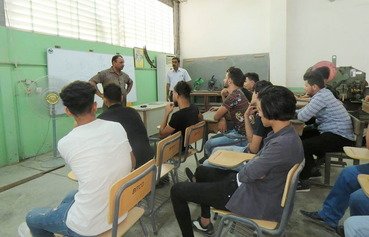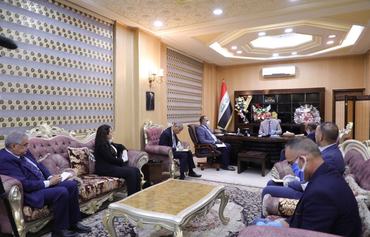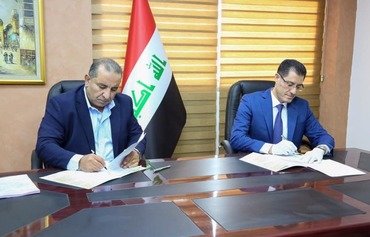As part of its efforts to address youth unemployment, the Iraqi government has launched a new programme that aims to support medium-sized industrial or production-driven businesses.
The National Programme for the Employment of Youth, announced January 21st, will extend loans to Iraqi youth looking to start their own business.
It is "the result of two years of studies and consultations among representatives of the government, parliament and relevant authorities", said Ismail al-Aboudi, general co-ordinator for the programme at the Ministry of Labour.
It is a large programme that aims to provide real job opportunities that reduce unemployment, revive the economy and increase productivity, he told Diyaruna.
![Minister of Planning Nouri al-Dulaimi chairs a meeting of the Supreme National Authority for the Employment of Youth. [Photo courtesy of Iraqi Ministry of Planning]](/cnmi_di/images/2020/02/05/22186-iraq-meeting-officials-600_384.jpg)
Minister of Planning Nouri al-Dulaimi chairs a meeting of the Supreme National Authority for the Employment of Youth. [Photo courtesy of Iraqi Ministry of Planning]
The programme works by providing operating capital of no less than $250,000 to mid-sized businesses that focus on industrial and food production, he said.
This capital is provided in the form of group loans for the beneficiaries, up to 10 youth for any production business, in addition to the manager or expert who is responsible for running the business, al-Aboudi said.
"We plan on creating 100,000 job opportunities this year, and to double that figure every year," he said, with the ultimate goal of creating a million jobs within seven years.
In its initial stage, the programme will cover Baghdad, Basra, Dhi Qar, Anbar and Ninawa provinces on a trial basis, he said. After that, it is expected to expand throughout the country.
The first five provinces were chosen based on their "high levels of poverty and unemployment, the need for reconstruction and development projects and potential success rates of businesses", al-Aboudi said.
"The programme does not compete with the employment projects adopted by other government entities, incubators for small business or private bank loans provided to young people," and in fact complements these efforts, he said.
The goal is to combine the expertise of the business manager and the energy of the young entrepreneur, he added.
Reducing unemployment
A higher governmental body was formed in January to oversee the programme.
Headed by Minister of Planning Nouri al-Dulaimi, it includes representatives from the ministries of planning, labour and commerce, the Central Bank, the private sector, civil society organisations and economists.
Permanent headquarters have been established at the Ministry of Planning, ministry spokesman Abdul Zahra al-Hindawi told Diyaruna.
The Central Bank is providing one trillion Iraqi dinars ($840 million) in funding to the programme, he said.
It is is one of several strategic programmes and projects the ministry has launched to address challenges facing the country, with unemployment topping the list, he said.
These include "the five-year development plan, the strategy for fighting poverty and the programme to restart industrial and product-driven projects that were halted as a result of terrorism and the economic crisis".
All these strategies include plans to drastically reduce unemployment by providing soft loans "to help build profit-generating businesses and to help develop skills", al-Hindawi said.
Iraqi youth demand work
Fighting unemployment is one of the key demands that Iraqi demonstrators are calling for in the protests that have erupted over the past four months.
"Unemployment was and continues to be one of the main driver of the protests, as statistics show an increase in unemployment to record levels that have reached 40% in such provinces as al-Muthanna," said economist Faleh al-Zubaidi.
The unemployment crisis is exacerbated annually, especially among young graduates, as a natural consequence of population growth and the inability of the public sector to absorb more workers, he told Diyaruna.
"It is important to push for reviving and supporting private sector companies and small and medium-sized businesses," he said, as this will create jobs that boost the economy and foster development, without burdening the state budget.
Riyadh Saeed, an unemployed university graduate, told Diyaruna he has been unable to secure a government job despite having applied to many agencies.
He expressed hope that he could "secure a suitable job after the launch of the new employment programme", noting that the government has a responsibility to help young people find suitable jobs.

![Unemployed Iraqi youth attend a computer training course in Baghdad on January 27th. [Photo courtesy of the Vocational Training Centre in al-Shula, Baghdad]](/cnmi_di/images/2020/02/05/22187-Iraq-Baghdad-training-600_384.jpg)







I like it!
Reply2 Comment(s)
Good.
Reply2 Comment(s)